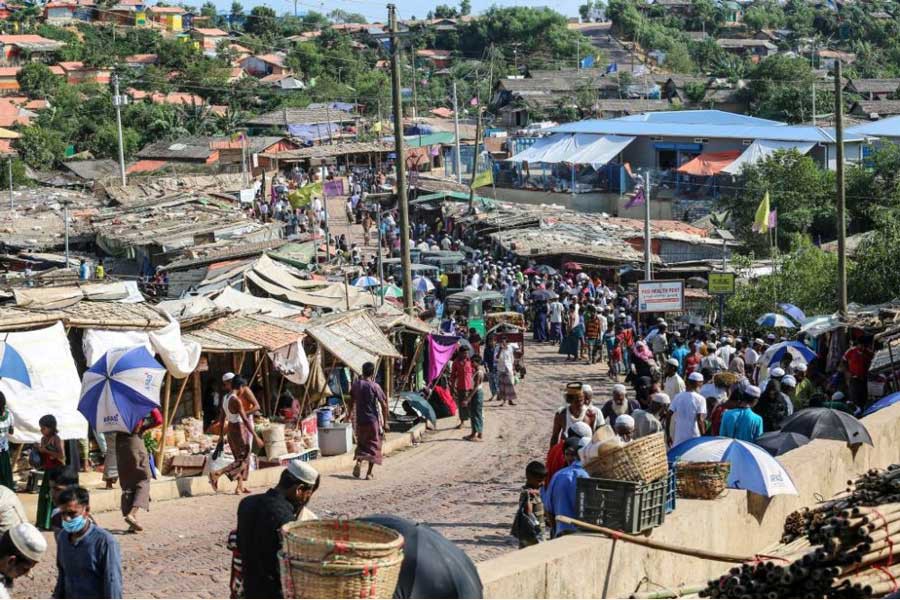
Published :
Updated :

So, Myanmar has agreed in principle to take back 180,000 Rohingya of the more than 1.0 million of this ethnic people it evicted from the country's Rakhine State. In a meeting between Dr Khalilur Rahman, a high representative of the Bangladesh interim government's Chief Adviser and U Than Swe, deputy prime minister and foreign minister of Myanmar on the sidelines of the 6th BIMSTEC summit in Bangkok, the later confirmed the list of the 0.18 million Rohingya refugees for repatriation. This certainly is a major development in the political environment between Bangladesh and Myanmar.
This green signal marks a major shift in the policy of the Myanmar ruling military junta on the ethnic minority which was not only denied the rights the majority Buddhist community enjoys as the citizens of the country but also made stateless under a government-sponsored pogrom. By conceding the truth behind the nativity of Rohingya refugees, the Nay Pyi Taw ruling military government has not only indicated its readiness to start the process of repatriation but also improve relations with the neighbouring country hosting the largest concentration of refugees for years at a heavy cost.
The Myanmar move looks even more positive because subject to the final verification, another 70,000 Rohingya refugees may be issued clearance for their return to their native country. That will make the total of the refugees eligible for return a little less than one-fourth of the displaced population. The Myanmar side has also expressed its seriousness about prompt verification of the remaining 550,500 refugees. If this is what the military authorities mean, the repatriation may begin immediately with the 180,000 already found genuine nationals of that country. But the question is, if the situation in Rakhine is favourable for return of the Rohingya. That state on the other side of the Naf river is not under the control of the government. In fact, the Arakan Army fighting the government forces controls major parts of that state. Unless the warring parties guarantee safe return and security of life and property of the Rohingya, the refugees are unlikely to submit them to the two sides' crossfire.
But the process of repatriation cannot wait any longer. Now that the junta government has agreed to the Rohingya return, the United Nations must press into service all its instruments to broker peace in Rakhine State. If this is not possible, at least a safe zone for them has to be created through negotiation. Neither of the warring parties will violate the boundary of the area no matter how intense the fight between them is. If needed, international peacekeeping forces will have to be deployed there to ensure that the government forces and the Arakan Army respect the treaty signed by all the parties involved.
Understanding and cooperation between and among the three parties ---Bangladesh, Myanmar and the Arakan Army under the UN supervision will be in demand for the repatriation to happen. The UN agencies like the United Nations High Commissioner for Refugees (UNHCR) and the UN Food Programme (UNFP) have to take a more proactive role in this regard. After all, the Rohingya refugees' post-repatriation rehabilitation is highly important.
In this context, the population boom in the refugee camps should also be taken into consideration. By 2017, the number of Rohingya refugees nearly reached a staggering number of 1.0 million but high rate of birth at the Cox's Bazar camps over the past years raised the total population to 1.2 million approximately. The names and photographs of the children born in the camps during this period have no match in the census documents of the Myanmar authorities. Hopefully, this additional young populace will not make any contentious issue.
The junta government should resolve the refugee issue in its own interest. Not only has it lost vast territories to rebel ethnic groups including Suu Kye's the National League for Democracy-led National Unity Government's armed wing the People's Defence Force (PDF) but also the devastation wrought by the earthquake of March 28 has slackened its political grip and left its economy vulnerable.


 For all latest news, follow The Financial Express Google News channel.
For all latest news, follow The Financial Express Google News channel.